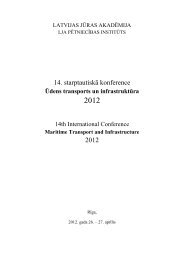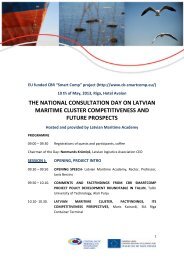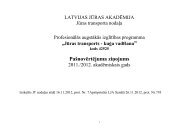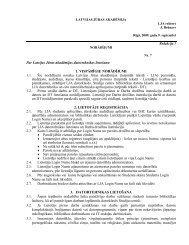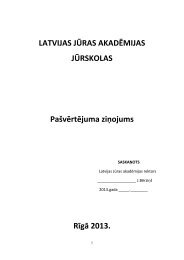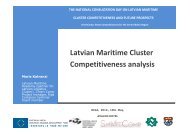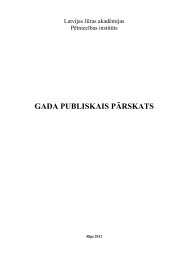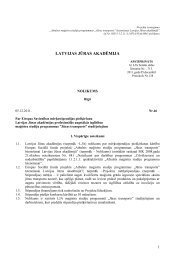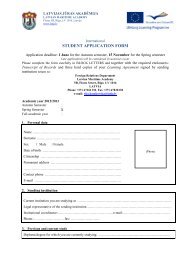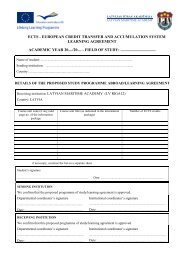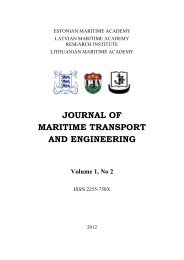Later the atheistic moralism started to spread in the post-protestant Western civilization as well as ingeneral European civilization. We have identified a negative approach of North West European seafarersand maritime businessmen to seafarers of Eastern Europe. It may indicate a latent dissatisfaction, becausethe seafarers of Eastern Europe are characterized by better education. Intellectually cultural climate wascreated on boards 20 and more years ago. The Eastern Europeans had a positive attitude to professionalsense of higher education and the value of a seafarer’s personality. The seafarers had a gym, a library, aconcert hall, musical instruments, etc. on board.The seafarers’ recreation usually included and includes so far reading, blog writing, poetry creation,music, painting and photography in regard to their psycho-prophylactics. This is a psycho-educationalcounterweight to the pornographic trend, at the level of imagination hygiene. Such high level of thepersonal and communication culture of seafarers was not achieved in the fleets of the NorthwestEuropean protestant countries. The STCW convention requires social responsibility on board [16], but thetrends of xenophobia and discrimination at the levels of sex, ethnicity, politics and religion dominate ontheir ships so far. The extremes of the Calvinistic Reformation influenced a decline of the value ofseafarer’s personality in the formation of the professional maritime self-concept.In conclusion, the future seafarers’ training should be based on the universal upbringing, becausethey must become leaders.Valuable possibility of the development of future seafarers’ leadershipAutonomy, independent thinking, planning, decision-making, strong and responsible operation aremost important features of seafarers’ leadership. Seafarer’s autonomy is a part of his self-management,self-regulation, self-control and self-confidence. These features help to shape the seafarer’s authority inthe crew, adequately communicate with different members of the crew, create a team from the group ofdifferent members, make a positive influence and educate them. A leader takes care of own and anotherperson’s dignity.Education of the wide maritime self-concept, regular professional improvement and flexiblerelationship with other people from the point of view of professional challenges is very important forleadership. These professional challenges may be strategic or may relate to the challenging maritimepolicy, and comparatively minor. E-learning and the reality of protestant maritime economism as ahistorical result of ideological development in Europe form the problem of valuable direction of theleadership development of future seafarers in the context of this article.Higher psycho-emotional stress dominates in the working conditions of the seafarers. It isappropriate to educate the maritime students’ leadership, respect for laws of the educational psychologyand teach how to avoid primitive objectification of the personality at the level of behaviorism. Thepersonality must unfold freely. A man is alive not by bread alone. Socio-cultural education of maritimestudents helps to harmonize physical and spiritual elements.Technologically standardized and computer-based training is very important. However, it has limitsin regard to psychosocial education. The leader must have interpersonal and multi-cultural competencesand be able to properly communicate with oneself and others. People are living beings, but not robots.Psychosocial education helps to develop imagination, creativity, observation and critical thinking. Everyhuman has aspiration for self-realization in reference to naturally and authentically socio-cultural life.The future maritime leaders must learn to speak maritime English and develop rhetoric skills,imagination hygiene, physical and psychic health. Technology-based education can and should beharmonized with the development of communicational competencies. The future seafarers need teachers -leaders, especially older seafarers, whose leadership is characterized by authority in a positive sense fromthe point of view of the maritime students.The seafarers experience difficulties at the extreme work and relationships on board. It is veryappropriate to develop the reflective writing competence in regard to the leadership self-education. Thetraditional blog writing as a natural silent self-expression under the conditions of loneliness is an effectivemeasure of self-management. It was mentioned earlier, that reflective writing is a creativity that helps torealize management of attention, liberation and management of emotions, structuring of ideas, selforientation,imagination of the practical sense of life, finding of solace, deepening and maturing of thepersonality’s relationship with oneself, and hopeful planning of duties. These functions are very importantat the cognitive level and can psychologically stabilize the personality.The future maritime leader must develop relevant competencies of creativity in non-standardsituations, manage the psycho-emotional stress and bravely take responsible actions. So, it is appropriateto develop critical thinking of maritime students alongside with e-learning and its standard. Critical32
thinking is innovative, responsible and integrated. The studies of adequate and positive philosophy of thepersonality and psychological mechanisms of leadership are important.<strong>Maritime</strong> students note that learning with a simulator does not develop responsibility, because“nothing happens by mistake”. The future seafarers are permanently taught to look around on board andonly then trust devices, which are always far overdue, at the level of professional practice [1]. Themodern and classical paradigms are applied at the level of the sense of learning in regard to the integratedupbringing of students. The modern paradigm highlights e-learning and a simulator training. The classicalparadigm expresses valuable and experiential education. The students can develop universal andintegrated (personal, valuable, psychosocial and special-professional) competencies and achieve results ofhigher maritime studies.The maritime sector enhances economic growth at the global level. It may be the most importantcondition for the development of civilization. However, not ships, but people carry cargo. Theircharacteristics, quality of performance and personal attitude (towards themselves, others and work)determine development and welfare of the whole maritime sector. The tendencies in economism (whensaving becomes more important than the conditions of the seafarers’ training, working, recreation andsocial guaranties) damage the whole maritime economic system.The seafarer is a personality who has his / her own life history and experiences, develops his / hercareer and dreams of the future. The training of the seafarer’s leadership, which is characterized by themotto - as soon as possible and as much as possible, is anthropologically impossible. It is very importantthe ideology of development of the future seafarer, sea captain and crew leader, which is characterized bydemocratic orientation. It is the leader who can manage emotions at the cognitive level, be patient andable to motivate and ensure discipline.It is not possible to universally develop the seafarer’s personality following the historic ideology ofthe protestant economism. The personality becomes spiritually autonomic on condition that the educationsystem helps him / her to cultivate personal confidence and trust in the maritime system, the employersand social guarantees. Education provides acceptable results only if the educational and maritime systemstrust in the educators and the seafarers, and when a self-conscious person performs well unattended. Toostrict control reduces creativity of the personality, self-confidence, trust in the maritime system anddevelopment of leadership. Control and supervision must be combined with trust. It is very important thatthe seafarers and maritime students have trust in the maritime sector and the maritime academies. So, theycan estimate their personal value, take responsibility and become leaders.A narrow approach to the personality and its development creates the slavish system and posesvarious risks to the maritime sector. The challenges are numerous. An increasing number of the non-Europeans, including Muslims, are working at the maritime sector. It may be very difficult to managethem. They may be completely uncontrollable at sea under extreme conditions. The maritime policies andthe STCW convention require development of the seafarers’ leadership. However, the maritime higherschools must be able to critically evaluate the situation in the maritime labor market and global trends.The maritime students can become free, creative and industrious personalities without extremes. So, theymust be able to combine work and rest, and take care of their physical and psychic health, leadershipculture, professional vocation and its development, positive sense of their freely chosen personal andsocio-cultural life.The development of leadership stimulates respect and tolerance for others. It is an important subjectof the socio-humanitarian and multi-cultural education of seafarers. The development of maritimeleadership in general is art. It is appropriate to help the students understand that the leader is not a superindividualand indifferent or socially insistent in the crew. He is supposed to have trust in others andnever violates the privacy of others, meddling in other peoples’ private lives.Modern maritime economism is characterized by a rapid handling of cargoes, decrease in thenumber of crewmembers and opportunities for seafarers to go ashore. The presence on board mostlydetermines all their professional life. Seafarers have to do a hard work. They are experiencing afrequently unlimited regime of work and recreation, long work time, noise, vibration, change of weatherconditions, isolation from their family and friends, psycho-stress and psychological terror [19].So, investment into the anthropologically grounded conditions of the psychosocially and universallyprofessional development of the future seafarers helps to ensure the leadership development and isappropriate as a preventive measure of higher conflicts, deliberate mutilation and suicide at sea.33
- Page 1 and 2: ESTONIAN MARITIME ACADEMYLATVIAN MA
- Page 3 and 4: CONTENTSRoberts GailītisASSESSMENT
- Page 5 and 6: 1. The aim of research and methodol
- Page 7 and 8: Figure 2. Age structure of merchant
- Page 9 and 10: their maritime education, takes dec
- Page 11 and 12: Therefore it can be concluded that
- Page 13 and 14: MULTI ZONES HVAC SYSTEMS’ CONTROL
- Page 15 and 16: Figure 1. Multi-zone air-conditioni
- Page 17 and 18: The control mechanism of the mathem
- Page 19 and 20: Results and discussionThe temperatu
- Page 21 and 22: PREDICTION OF EMISSIONS AND PERFORM
- Page 23 and 24: In order to measure brake torque, t
- Page 25 and 26: Predicted & Actual Values of SFC, g
- Page 27 and 28: 8. Canakci, M., Ozsezen, A.N., Arca
- Page 29 and 30: It is appropriate to systemize the
- Page 31: Protestant ideology as an eventual
- Page 35 and 36: 17. Professoren-Protest gegen 10 Ja
- Page 37 and 38: affected by competing ports [2]. Ne
- Page 39 and 40: Tendencies of cargo flows volume an
- Page 41 and 42: increase, inflation decreases, beca
- Page 43 and 44: 4. Belova, J., Mickiene, R. Economi
- Page 45 and 46: Description of researchIf volume co
- Page 47 and 48: p p 1 10(11)C021Here, C1is a speed
- Page 49 and 50: Figure 4. Dependence of pressure on
- Page 51 and 52: EXPERIMENTAL INVESTIGATIONS OF IC D
- Page 53 and 54: Figure 2. Prototype of variable geo
- Page 55 and 56: 4. Experimental equipment and softw
- Page 57 and 58: Figure 6. Dependence of main indice
- Page 59 and 60: Figure 8. Dependence of main indice
- Page 61 and 62: DEVELOPMENT AND APPLICATION OF SIMU
- Page 63 and 64: program was developed regarding the
- Page 65 and 66: F11: High sea water pressure alarmF
- Page 67 and 68: In the main interface as given in F
- Page 69 and 70: Figure 7. Failure mode selection sc
- Page 71 and 72: Figure 11. Causes of failure select
- Page 73 and 74: 6. Xiaoyan, X., Min, H., Huayao, Z.
- Page 75 and 76: Asia region is fastest developing n
- Page 77 and 78: performance of design. Speed is the
- Page 79 and 80: In summary, it can be said that wor
- Page 81 and 82: ReferencesArticles1. Belova, J., Mi
- Page 83 and 84:
Grain cargo life cycleGrains are ca
- Page 85 and 86:
Maritime law is made and enforced b
- Page 87 and 88:
European and Asian countries, and e
- Page 89 and 90:
EVALUATION OF IMO SECOND GENERATION
- Page 91 and 92:
Sample vessel: a container shipA co
- Page 93 and 94:
Natural roll frequency in calm wate
- Page 95 and 96:
REQUIREMENTS FOR THE MANUSCRIPTSSUB



